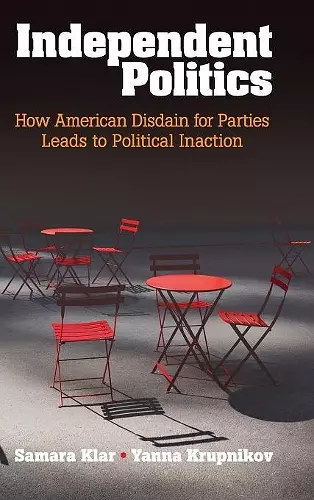Independent Politics
How American Disdain for Parties Leads to Political Inaction
Yanna Krupnikov author Samara Klar author
Format:Hardback
Publisher:Cambridge University Press
Published:21st Jan '16
Currently unavailable, and unfortunately no date known when it will be back
This hardback is available in another edition too:
- Paperback£29.99(9781316500637)

This book analyzes why combative politics stigmatizes Democrats and Republicans, thus Americans avoid political actions that could identify them as partisans.
This book argues that the tone of politics stigmatizes Democrats and Republicans, driving people with partisan preferences to identify as independent. The study is aimed at those interested in politics and the media, political communication, political parties, public opinion, participation, and elections and voting behavior.The number of independent voters in America increases each year, yet they remain misunderstood by both media and academics. Media describe independents as pivotal for electoral outcomes. Political scientists conclude that independents are merely 'undercover partisans': people who secretly hold partisan beliefs and are thus politically inconsequential. Both the pundits and the political scientists are wrong, argue the authors. They show that many Americans are becoming embarrassed of their political party. They deny to pollsters, party activists, friends, and even themselves, their true partisanship, instead choosing to go 'undercover' as independents. Independent Politics demonstrates that people intentionally mask their partisan preferences in social situations. Most importantly, breaking with decades of previous research, it argues that independents are highly politically consequential. The same motivations that lead people to identify as independent also diminish their willingness to engage in the types of political action that sustain the grassroots movements of American politics.
'Despite being aware of the existence of closeted partisans for quite some time, we know next to nothing about them: who they are, what motivates them to go undercover, the political and psychological conditions that increase their numbers, and how this affects American democracy. In Independent Politics, Klar and Krupnikov provide a fascinating and timely analysis of the psychological underpinnings of closeted partisanship. Using a combination of clever experiments and observational studies, the authors convincingly demonstrate that political disagreement leads many Americans - in particular those who are strongly attuned to social norms - to take a dim view of political parties, partisanship, and partisans. The political consequences of their analysis for democratic citizenship and political representation are far-reaching.' Howard Lavine, University of Minnesota
'The political science literature contains numerous claims about independents, most of which rest on a very thin bed of evidence. This book tells us as much about today's independents as the extant literature combined. It is a must-read for anyone interested in American public opinion and elections.' Morris Fiorina, Stanford University, California
'Klar and Krupnikov show, through a series of clever experiments, that although independents may vote like partisans, their disdain for parties leads them to go 'undercover', and avoid all manner of expressive political behaviors. Independent Politics is a fascinating read that makes a significant contribution to the subfields of political participation and political psychology. It will drive scholars to think about the decision to identify as independent in heretofore unrecognized ways.' Joanne Miller, University of Minnesota
'Klar and Krupnikov show that avoiding partisanship is a meaningful decision that has important implications for civic engagement. Using a variety of convincing tests, Independent Politics is a major work that will undoubtedly shape future research on partisan politics in the United States.' Stephen P. Nicholson, University of California, Merced
'… an excellent book. It lays out clearly a compelling theory and several key expectations, which are then tested with a series of clever experiments as well as observational evidence from the American National Election Studies … I should also add that while I highly recommend Independent Politics to scholars of public opinion and elections - and expect it will show up on graduate syllabi for such courses - I can also imagine it being used in an upper-division undergraduate course, given its lively and accessible language.' Judd Thornton, Public Opinion Quarterly
'The central finding of this book is that many independents identify as such because of concerns regarding how they will be perceived by others. In the minds of these voters, parties are increasingly seen as negative and embarrassing. To avoid being tainted with the stigma of partisanship, more and more voters are choosing to identify as independent. The book closes with a bracing examination of the possible implications of this development for American representative democracy … Highly recommended. Upper-division undergraduates through faculty.' M.D. Brewer, Choice
ISBN: 9781107134461
Dimensions: 238mm x 152mm x 17mm
Weight: 420g
272 pages